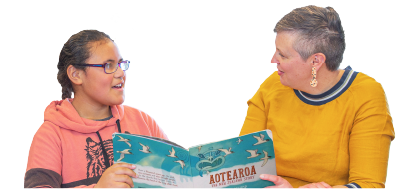The importance of identity
Show video transcript
Sunema Tepulolo, student, Kelston Girls’ College, Auckland, facing camera
My culture means basically everything to me. It's my identity, that's where my parents come from. So yeah, everything I guess.
Rosaline Latuila, student, Kelston Girls’ College, Auckland, facing camera
Yeah, same as me. My culture means everything to me. It's who I am.
Sunema Tepulolo, student, Kelston Girls’ College, Auckland, facing camera
Kelston allows me to embrace my culture. Because we have Polyfest, we have a Tuvaluan group here, which allows us to bring all the Tuvaluan kids together. We learn more about our culture in doing, like, our dance.
Rosaline Latuila, student, Kelston Girls’ College, Auckland, facing camera
For us, growing up in our Intermediate they weren't allowed to like, you know, we weren't allowed to show off our culture and what it means to us, but in Kelston Girls’ College we are able to do that.
Sunema Tepulolo, student, Kelston Girls’ College, Auckland, facing camera
My parents, my culture, literally carrying them on my back, but it's a good thing because it's like a motivation for me to keep striving because it's not, I'm not only representing myself but my parents, Tuvalu.
Student, Cook Islands group, Manurewa High School, Auckland, facing camera
So one message I want to get out to everyone, to our teachers, to our students, and to the people of our community is to be proud of who you are, to be confident with your culture, to be confident with yourself and your background behind you because everyone has a story behind them.
Images of other students
Student, Cook Islands group, Manurewa High School, Auckland, facing camera
Doesn’t matter what it is, just be proud of who you are, be happy and stay strong within yourself and strong within your community.
Student, Cook Islands group, Manurewa High School, Auckland, facing camera
Everyone’s got a story to tell, it’s just opening your ears if you are willing to listen, you know, and just hear them out and everyone, then it just makes things better. Yeah, I guess, listening is my message, just listen – hear us out.
Student, Cook Islands group, Manurewa High School, Auckland, facing camera
You know, don’t be shy to be who you are or what culture you are.
Groups of students performing
Just make sure you know who you come from and be hearty in what you believe.
You know for yeah, just be strong in what you believe, if someone tells you that what they don’t like about you, your culture, you say, you just keep it positive and just tell them you know what, “all good.”
In this video, we can see how cultural identity creates a strong sense of belonging for a learner. Embracing the identity, culture, and language of diverse learners is a huge motivation to encourage them to strive for success. It is important to create an environment that nurtures and values diverse cultural backgrounds so that learners feel supported, respected, and are able to uphold their cultural identity in their learning environment.
Reflections for individual teachers
The various narratives in this video illustrate what can be achieved if teachers and a school embrace their learners’ cultural identity. As you watch this video, reflect on:
- What excites you about learning about the diverse Pacific cultures? How are you fostering culture and identity in your teaching and lessons? Think of cross-curricular activities and focus on your Pacific learners.
- What techniques will you use to embrace the culture and identity of students from different backgrounds? How can you create a culturally responsive classroom where your learners can uphold their cultural identity?
- How are you promoting the home languages of your learners inside the classroom and outside their home community and families? How can you build up a classroom of diverse learners so that they can do their best?
- How are you communicating your own cultural identity to your learners? Think about how you will lead the conversation, and how you will share with your students that you do not have all the experiences or answers needed to fully address the diversity in your classroom.
Reflections for staff or departments
If you are watching this story as a staff member or member of a department team, think of a culturally relevant curriculum – what does culturally responsive pedagogy look and sound like to your staff and departments?
- How do your teaching staff use culturally relevant teaching methods to connect with their Pacific learners, and how do your teaching staff feel about themselves and their teaching methods?
- Imagine that there is a disconnection between a student’s cultural background and a teacher’s cultural background in your school; how could you bridge this gap? How can you collectively build a community culture by catering for individual needs?
- How are you creating a school environment that supports cultural diversity? What professional development and tools are you offering to your teaching staff to assist with respecting differences and enhancing diversity in their classroom?



